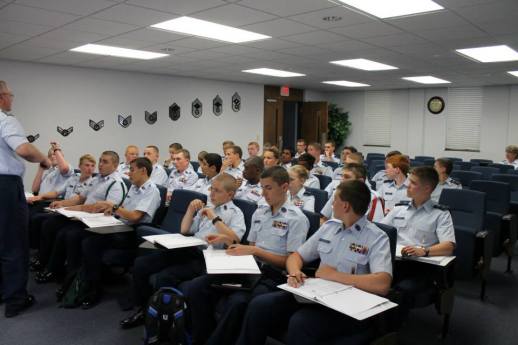Cadet Programs

Civil Air Patrol’s first cadet program was started during World War II as a way to provide training for future pilots. Since then, the program has flourished, combining Aerospace Education with Leadership and Career training.
Today, CAP cadets are those members who join between their 12th and 18th birthday. Cadets who turn 18 may either become a Senior Member or remain a cadet until 21 at their own discretion. Cadets who join the military automatically become senior members when they receive their first orders.
As a Cadet progresses through the cadet program, they earn various achievements by successfully passing both Leadership and Aerospace Education tests. Test questions are derived from reading materials supplied to cadets, but the program is also designed to allow cadets to fill ever increasing leadership roles that are pertinent to their Leadership Studies questions.
As cadets advance through the ranks, they also progress through four stages of development. The first phase, The Learning Phase, introduces cadets to the CAP program, and cadets who pass all requirements receive the Wright Brothers award. The second phase, The Leadership Phase, begins placing more responsibility on cadets as leaders of newer cadets. Cadets who complete The Leadership Phase receive their Mitchell Award, and are eligible for advanced promotion upon enlisting in the military. The third phase, The Command Phase, places cadets directly in command of other cadets, allowing cadets to accomplish tasks through their staff members for the first time. Cadets who complete The Command Phase are awarded the Earhart Award. The Executive Phase is the last phase of the cadet program, and focus cadets on the operations of an entire unit. Cadets completing the command phase are awarded the Eaker Award, and may be awarded the Spaatz Award upon passing an extensive cumulative test.
As cadets progress through the program, they are placed in charge of lower ranking cadets. Cadets aren’t given full reign over the others, but instead are expected to instruct classes and mentor each other. Senior Members, the adults of the program, also play a large role in mentoring and evaluating cadets. The numerous awards, achievements, and opportunities available to Civil Air Patrol cadets allows them to foster their leadership in an academic and forgiving environment.
Civil Air Patrol also has several cadet squadrons located in middle schools. CAP’s School Enrichment Program (formerly known as Middle School Initiative) is a ready-to-use program for teachers and other mentors conduct leadership training through Aerospace Education classes. Students are introduced to the principles of flight, model rocketry, and also leadership. CAP’s SEP program is similar to a Junior ROTC program. CAP has 47 units located in Middle School classrooms throughout the country.